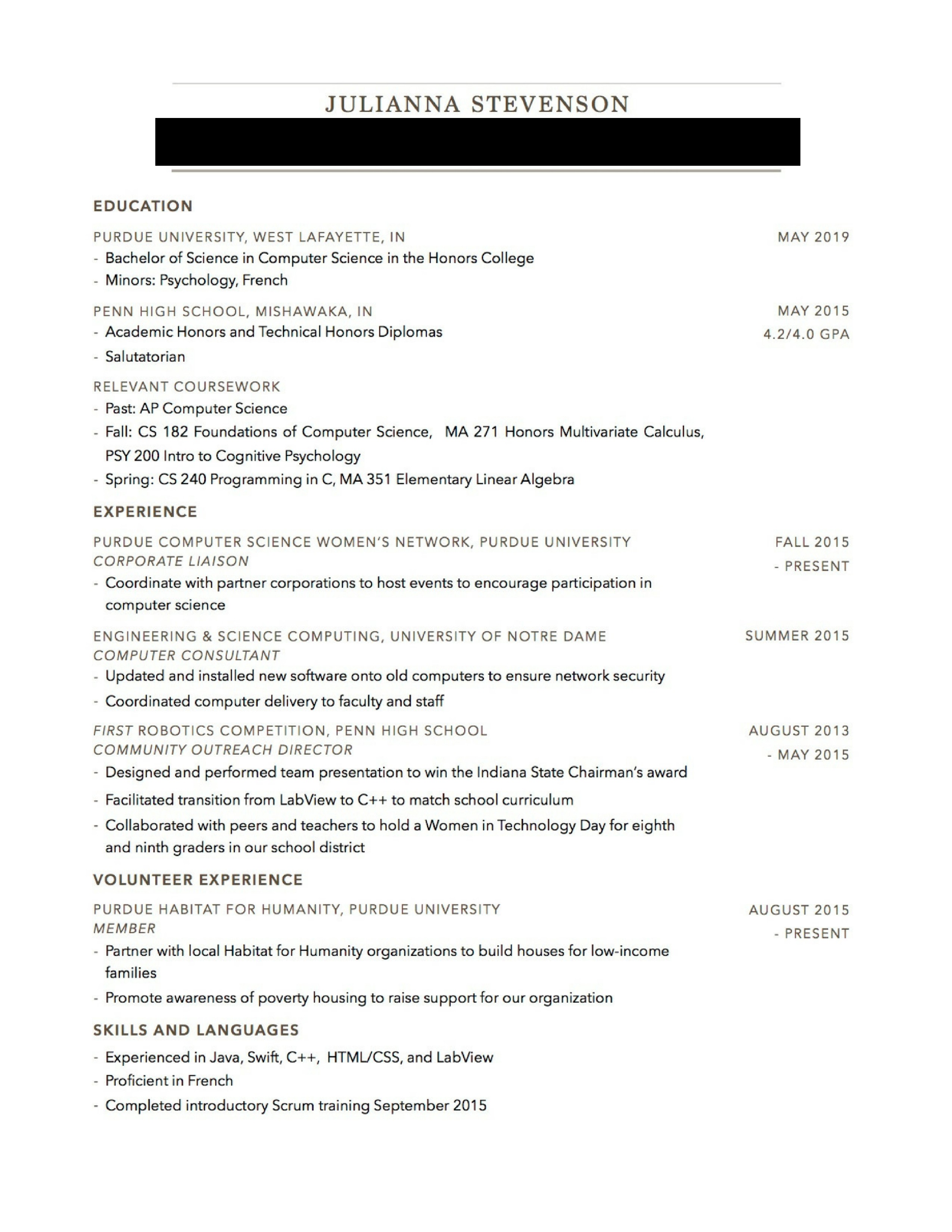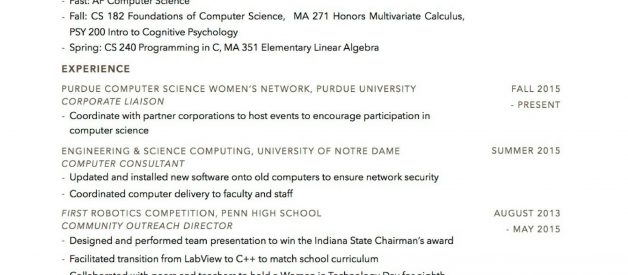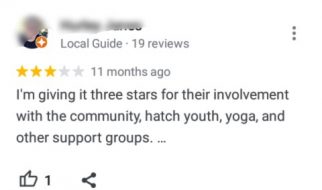As a freshman in Computer Science at a big university, I never thought that I would be one of the lucky few to get an internship offer after my first year, let alone three offers from some amazing companies.
You may have heard discouraging stories of trying to get an internship as a new student, but I want to share the other side of the story, because it?s totally possible!
There are a lot of ways that students find internships, and I used three of the most common techniques for finding them ? applying online, going to career fairs, and going to company events.
The first offer I received came from applying online to a program called Xtern. Xtern connects students with companies in the Indianapolis area. You apply once to the program and you?re effectively applying to all of the companies in the Xtern program.
The Resume
When you?re applying online, your resume is key, because that?s all companies have to go off of to decide whether or not to give you an interview. So, my first step was getting my resume ready to go.
There are a few key pieces of advice I thought about when creating my resume:
- As a freshman, it?s perfectly acceptable to include things from high school. When you?re a month into college, you probably won?t have much to put on your resume yet. Make sure to include any projects, leaderships positions, awards, etc. from your high school career.
- Use action verbs to describe your experiences.
- Include technical skills. That list might not be very long right now, but think about adding languages you know!
For reference, here?s my resume from freshman year:
 My resume from first semester freshman year.
My resume from first semester freshman year.
The personal information edited out includes my email, phone number, and link to my github.
Once I had my resume fixed up, I submitted it to Xtern.
Coding Challenges
A few weeks later I got an email back with a link to an online coding challenge. Coding challenges are a common way for recruiters to parse through a lot of applicants quickly.
Most times you?ll be given a deadline for when you have to have the coding challenge done by. Some ask you to build some sort of small project. Those are usually untimed and give you some room for creativity.
However, the challenge I got was more pointed ? I had about a half hour to answer two questions, one requiring code and one related to design.
This was my workflow for those problems:
- Quickly skim the question for important information.
- Using the identified important information, spend a minute sketching out a plan of attack.
- Code/write my response.
- If I wrote code, test the code using test cases, making sure to identify and test edge cases (e.g. some sort of null case).
- Check for any misspelling/grammar issues.
Having to look things up during this process will slow you down significantly, so I tried to sticking to using things I knew. For example, it usually doesn?t make sense to spend those fifteen minutes to learn how to write heapsort if you already know how to write mergesort, even if you think that heapsort will look more impressive.
After the coding challenge, I got accepted into the Xtern program and went through a matching process that got me an offer from my first company.
Meeting a Recruiter at a Company Event
I got my second offer from a recruiter I met at an event, which is by far my favorite way of finding internship opportunities because it?s the most fun and you can learn a lot from the events you go to!
I attended a resume review event at my university, where a recruiter from company #2 was going over people?s resumes and offering advice. I went to the event and we went over my resume together. She asked me to email her resume and we went from there.
I was applying for an internship program specifically for freshman. The first round of interviews were behavioral. Behavioral questions can be a little tricky, because not only are they looking for content in your answers, but how you say them.
There are some common pitfalls I?ve seen in behavioral interviews:
- Don?t blame/talk badly of other people. This can be hard, especially if you?re talking about a bad experience in a team, but recruiters want to see that you can handle situations where you disagree with people maturely. Focus on behaviors and not personalities and what you could have done differently, not the other person.
- Don?t leave yourself in a bad light at the end of a question. For example, if they ask you about a time your failed, talk about the failure, but then follow up with what you would do differently or what you learned from the experience.
- Make every question count. Have multiple stories and experiences prepared to talk about. You might have had one really good experience that applies to a lot of interview questions, but you don?t want to give off the impression that that?s the only thing you?ve done.
Following these rules got me through the behavioral interview and onto a technical one.
After a simple technical interview, I had an offer from my second company.
The Career Fair
The third offer I received came from a company I met at a career fair. If you haven?t been to a career fair yet, they can be a little crazy.
Some people might tell you differently, but my opinion is that it?s not a great use of your time to wait an hour at the Google or Microsoft booth for a recruiter to just take your resume and tell you to apply online.
Instead, the strategy I used was to talk to companies that had little to no line. This is a great strategy, especially when you?re young and have little experience, because you?ll be able to talk to a lot more companies (and presumably these companies have less competition). Plus, recruiters get bored, so if you rescue them from the boredom of standing there, doing nothing by talking to them, you?ll probably have an interesting conversation and they?ll think of you positively.
Even if it?s a company you?ve never heard of, it?s still ok to talk to them. My goto intro for that situation is ?I?ve never heard of <insert-company>. Can you tell me a little bit about what you do?? It?s a great conversation starter.
That?s also the line that got me an interview from company #3.
The Interview
The company flew me (a nervous freshman) out to Chicago to interview at their headquarters.
For me, technical interviews are the worst part of the job hunting process. This is especially true because I, like most computer science students I know, often suffer from Imposter Syndrome.
The thing that help me the most was doing lots and lots of quality practice. The best way to practice is to try to recreate what a real interview would be like.
My goto for practice was to do mock interviews with friends. We?d ask each other common interview questions we found online and questions we had encountered in interviews before, and we would do our best to go through and solve them like we would in an actual interview.
The main thing I learned from that practice was to always slow down explain what I was thinking about. My biggest mistake was that I would jump right into trying to code a solution, but that?s not what my interviewers were looking for. They wanted to see my whole thought process of solving the problem, from going through examples to make sure I understood the problem, listing my initial ideas and explaining why they were or were not correct, and eventually how my code would look.
If nobody is free to help you out, try visiting these website to practice technical interview questions.
- https://www.hackerrank.com/
- https://projecteuler.net/
- https://leetcode.com
- https://www.firecode.io/
For more information about rocking that coding interview, check out Gayle McDowell?s Cracking the Coding Interview.
After interviewing at their headquarters in Chicago, I got an offer from my third company.
The Outcome
I got incredibly lucky in getting the offers I did, and I?m grateful for all the help and advice I got along the way.
In case you?re curious, I went with company #2 because I wanted the support of being in a freshman-oriented program.
Even though I highlighted my experiences with three specific companies, I think it?s important to point out that I didn?t mention the tons of companies I didn?t get offers from. There are lots of companies that didn?t give me an interview or stopped perusing me after I interviewed with them, and that?s a pretty common experience for most students, even upperclassmen.
There is no way to guarantee getting an internship freshman year ? a lot of really talented students don?t. There?s also no set path to getting one, but I hope that reading about my path will help you find yours.


